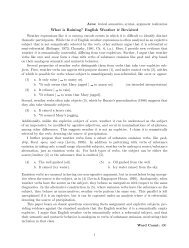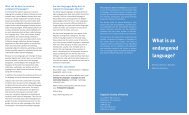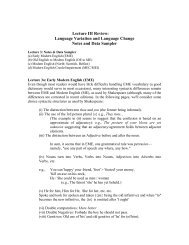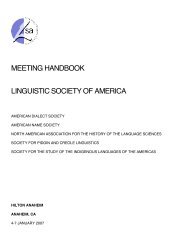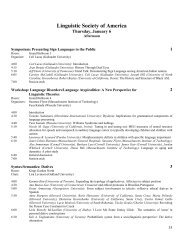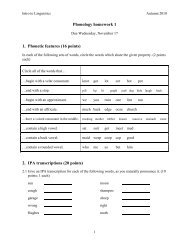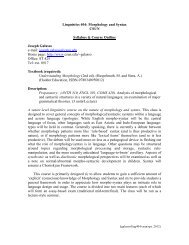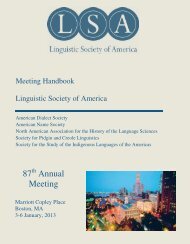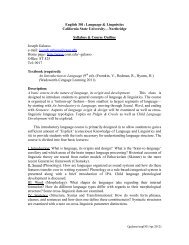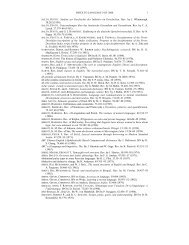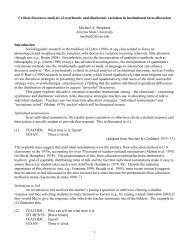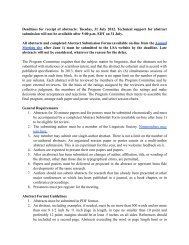here - Linguistic Society of America
here - Linguistic Society of America
here - Linguistic Society of America
You also want an ePaper? Increase the reach of your titles
YUMPU automatically turns print PDFs into web optimized ePapers that Google loves.
years do not produce compound stress but instead may use the phrasal stress since the second word <strong>of</strong> the compound is moreprominent than the first word. This raises the possibility that certain prosodic patterns might be acquired later, despite theevidence that children at a very young age appear sensitive to prosody in general.Kenneth P. Baclawski Jr. (Dartmouth College) Session 6The Kuki-Chin deictic complex: examining interconnected reference systemsIn many Kuki-Chin languages (Tibeto-Burman: Bangladesh, India, Burma), demonstrative and information status-markingparadigms display similar semantics and phonological forms. These forms occupy different syntactic positions, but, as this papersuggests, they constitute one macro-paradigm, a deictic complex. In Hyow (Kuki-Chin: Bangladesh), narrative and elicited datacorpora show that the complex has broken down, resulting in rapid semantic bleaching, phonological reduction, and theincorporation <strong>of</strong> new forms. A diachronic account <strong>of</strong> this system as a grammaticalization cycle is presented <strong>here</strong>. This accountexplains cross-family variation and gives insights into the relation between metaphor, paradigmaticity, and grammaticalization.Rebekah Baglini (University <strong>of</strong> Chicago) Session 34The lexical semantics <strong>of</strong> derived statesIt has been noted in the literature that stative participles do not form a homogenous class (Nedjalkov and Comrie, 1988; Kratzer,2000), but fall into two subclasses: target state participles (TSPs) and resultant state participles (RSPs). Prior approaches havecaptured this by positing two distinct stativizing operators. However, this dual approach is not only theoretically undesirable, butempirically questionable. This paper uses degree semantics to derive the contrast between TSPs and RSPs in a unified way.Stativization targets verbs <strong>of</strong> scalar change, and the TSP/RSP contrast reflects the type <strong>of</strong> scale associated with the verbalexpression: property scales and quantity scales, respectively.Rebekah Baglini (University <strong>of</strong> Chicago) Session 17Itamar Francez (University <strong>of</strong> Chicago)The implications <strong>of</strong> managingManage has been claimed to conventionally implicate trying as well as difficulty. This characterization is descriptivelyproblematic: for example, John managed to lose his keys implicates neither. This paper proposes a more precise characterization<strong>of</strong> the implicational pattern <strong>of</strong> manage, according to which the implicational meaning <strong>of</strong> manage does not involve trying butrather a more general notion <strong>of</strong> causal necessity. The implication <strong>of</strong> difficulty is argued to be pragmatic. We argue that teasingapart the role <strong>of</strong> truth conditional meaning, non-truth conditional meaning, and pragmatic reasoning, provides an empiricallyadvantageous characterization <strong>of</strong> the implicative behavior <strong>of</strong> manage.Rebekah Baglini (University <strong>of</strong> Chicago) Session 15Lenore Grenoble (University <strong>of</strong> Chicago)Martina Martinovič (University <strong>of</strong> Chicago)Wild sounds: extragrammatical communication in Wol<strong>of</strong>We describe a group <strong>of</strong> sounds that stand outside <strong>of</strong> the basic phonemic and/or lexical inventory <strong>of</strong> Wol<strong>of</strong> (Niger-Congo) but area core part <strong>of</strong> the language’s communicative system. We call these wild sounds and words following Pyle (2006). As noted byHarris (1951:71), they are found in exclamations, animal calls and borrowed words. The inventory <strong>of</strong> wild sounds and words inSenegalese Wol<strong>of</strong> includes a number <strong>of</strong> clicks (velar, lateral, dental and dental bilabial), a hissing sound, and a whistle. Wildsounds, while outside the grammar, are nevertheless a crucial component <strong>of</strong> linguistic communication, warranting further crosslinguisticstudy.Jon Bakos (Oklahoma State University) Session 59Bringing the thunder: a first look at the vowel system <strong>of</strong> OklahomaThis paper describes the current vowel system <strong>of</strong> Oklahoma, using recently collected data from the Research on the Dialects <strong>of</strong>English in Oklahoma (RODEO) project. This presentation will examine the wordlist and reading passage tasks from 25Oklahoman RODEO subjects.This paper will show Oklahoman empathy for Southern dialect practices, but without universal use <strong>of</strong> them. Most interviewedrespondents employ Southern features like the pin/pen merger and fronting <strong>of</strong> /u/, but Oklahomans appear reluctant to use sociallyemblematic Southern features in formal contexts. This paper will suggest reasons for these differences and discuss the Oklahomasystem as a whole.127



